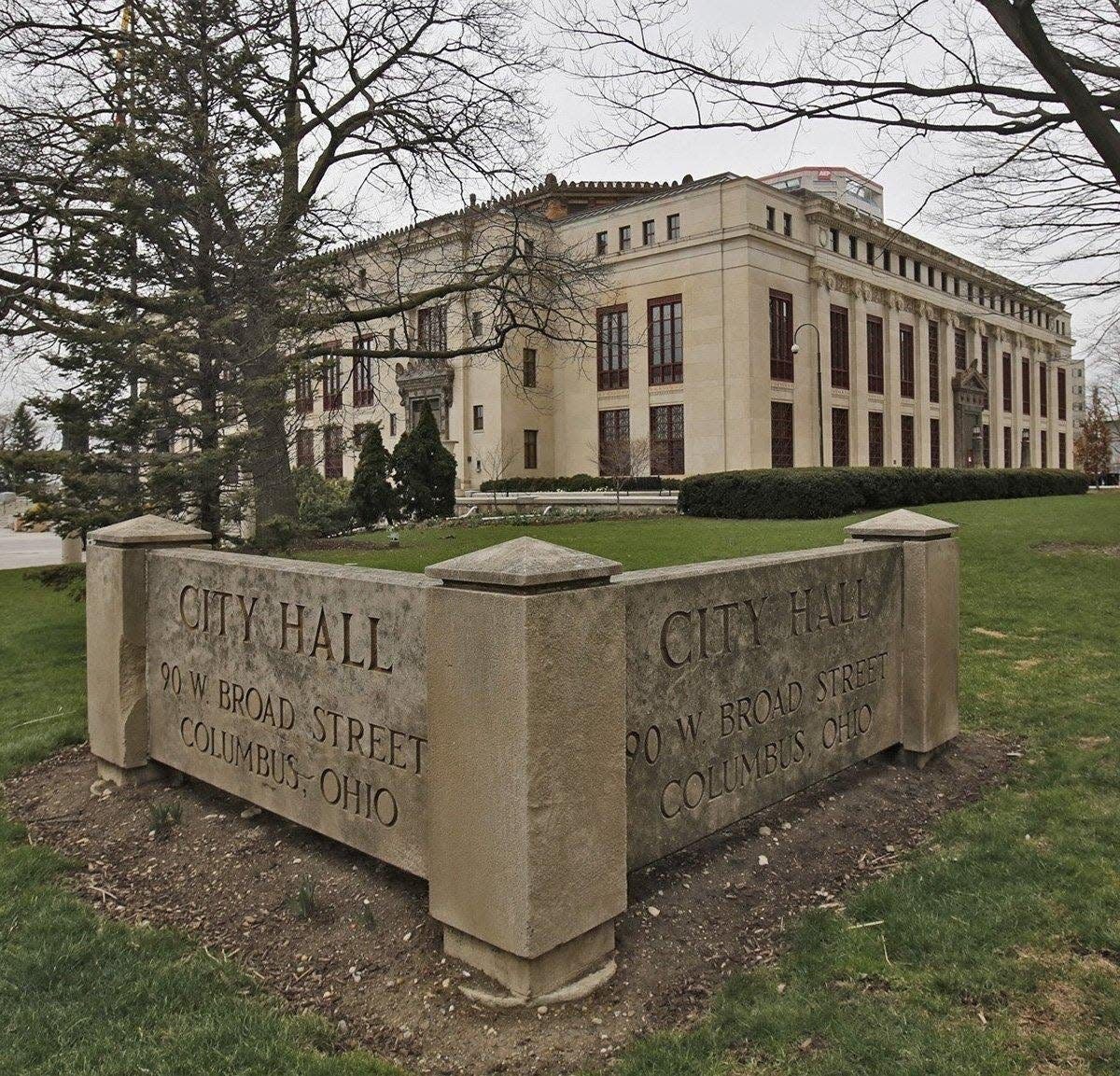Columbus' pick for special prosecutor in probe of Ginther's call to judge questioned

- Oops!Something went wrong.Please try again later.
When Brad Nicodemus attended the New Year's Eve swearing-in of Whitehall Mayor Michael T. Bivens, he was surprised to find that Columbus Mayor Andrew Ginther also was among the dignitaries present.
Bivens is Whitehall's first Black mayor, and Ginther, his friend of more than 20 years, helped usher in his administration at Whitehall City Hall.
When the gathering moved inside for a reception, Nicodemus, who succeeded Bivens as Whitehall City Attorney, remained outside.

"I told my colleagues and friends that I was not going in, knowing that Ginther is in the building. I didn't even want to enter the building because of that appearance … to be in that position, knowing that I am investigating his (Ginther's) conduct," Nicodemus said.
But skipping the reception may not be sufficient to avoid the perception of Nicodemus having a conflict of interest in the probe of Ginther, who stands accused of calling a Franklin County Municipal Court judge and trying to pressure her to "do the right thing" in a case involving shutting down a Greyhound/Baron's bus station near the Hilltop.
The contract for the Ginther investigation is signed by Bivens, not Nicodemus. In fact, it doesn't even name Nicodemus. Bivens said that was due to his sole authority as Whitehall City Attorney (before being sworn in as mayor) to enter the contract on behalf of a subordinate.
"We probably need to have them change that," Bivens said.
"I've known Mayor Ginther since we were young Dems (Democrats) more than 20 years ago," Bivens said, explaining that he personally invited Ginther to the swearing-in. "I consider him to be a friend."
Special prosecutor Brad Nicodemus has sided with city before
Nicodemus agreed last month to investigate Ginther, who has been accused of trying to pressure Franklin County Municipal Court Environmental Judge Stephanie Mingo into shuttering the Greyhound/Baron's bus station that moved out of Downtown last year. The new terminal has since raised concerns about safety and traffic at its North Wilson Road location, just south of Interstate 70.
In 2020, Columbus City Attorney Zach Klein's office chose Nicodemus, 43, a Whitehall assistant city attorney since 2014, to investigate whether a trio of Columbus police officers engaged in criminal misconduct for interactions with the public during Downtown protests following the death of George Floyd Jr. in Minneapolis.
More: Special prosecutor: Columbus police officer's use of pepper spray was reasonable
After Nicodemus's co-counsel, Kathleen Garber, quit her special prosecutor appointment following the dismissal of charges against two of three Columbus officers, Nicodemus stayed on to exonerate a third officer accused of using excessive force by pepper spraying several people who failed to move when ordered from Broad and High streets on May 29, 2020.
Nicodemus said he fairly investigated the cases. While police may have been overzealous and noncompliant with police policy, he said nothing justified criminal prosecution.
"They weren't necessarily illegal, and I'm not going to bring charges just because they are the popular thing to do," Nicodemus said.
He insisted he will judge Ginther with a similar approach. And that the legal definition of conflict of interest is different thant the public "impression" of a conflict.
A transcript of a hearing Mingo held after the alleged interaction with Ginther accuses him of calling her Oct. 11, less than a month before the Nov. 7 election, and urging: "We really need you to do the right thing for the community and shut it down," referring to the bus station. Nicodemus declined to say if there is a transcript or recording of the actual call.
Mingo notified all parties involved of the call within 24 hours, recused herself two months later and a new judge was appointed. A status conference on the bus terminal is set for Jan. 10 in Franklin County Municipal Court.
Ginther's former mayoral challenger persistent in attacks
Nicodemus said he was not aware of Bivens' lengthy friendship with Ginther.
Asked if he will continue in the probe, Nicodemus said: "I was asked to do a job. I've already begun and done interviews with people. I'd like to finish what I've done."
Joe Motil, who was soundly defeated in his bid Nov. 7 to unseat Ginther as mayor, said that Nicodemus, through Bivens, is "too close to Ginther," and that the consequences of not punishing Ginther are serious.
Motil said allowing ex-parte communication (granted to one party in a case without including the other) to occur without consequence would send the wrong message. "If nothing happens … it can happen again. A city official could go to a judge behind closed doors and try to influence them," Motil told The Dispatch.
According to directives of the Ohio Judicial Conference, which govern judges' behavior, ex-parte communications may be permitted “when circumstances require it” for scheduling, administrative or emergency purposes. They become improper when they address substantive matters and a judge "reasonably believes" that a party will gain a procedural, substantive or tactical advantage as a result.
Mingo recused herself from the case in December "out of an abundance of caution" that there might be a perceived conflict of interest.
Motil's attorney, Phil Harmon, asserts that Ginther could face either misdemeanor or low-level felony charges for obstructing official business and/or interfering with civil rights for secretly attempting to steer a judge on a matter of public importance.
In addition to the Ginther case setting precedent, Motil also is upset that Klein as city attorney, who represents the Ginther administration and the city, initially said of Ginther's call to Mingo "based on the known facts, no crime has been committed and there is nothing to investigate."
But after Motil filed a second complaint in Franklin County Municipal Court, Klein announced that Nicodemus would take the case, "because of our office’s conflict in already representing the city in the Greyhound case."
Late Wednesday, Harmon filed a motion in Franklin County Common Pleas Court to have a judge select a new special prosecutor, explaining: "It is ludicrous that a city attorney who admits a conflict of interest in a case would even think they have the legal right to choose the attorney … and to require that person to perform designated duties in a way that is satisfactory to the conflicted city attorney."
Ginther spokesperson Robin Davis referred questions about Nicodemus to Klein's office.
Klein spokesperson Pete Shipley said "We are not aware of any conflict regarding (Whitehall) City Attorney Nicodemus and Mayor Andrew Ginther."
Nicodemus co-special prosecutor expresses frustration over police abuse case
Garber, like Nicodemus, is a seasoned special prosecutor. She told WOSU-FM 89.7 in September 2022 that a lack of support and resources and a police culture that "left true accountability by the wayside" hampered her work on the Columbus police abuse case.
Garber said evidence of misconduct was clear, including what she called false police reports and uncooperative officers.
Protesters often "were peaceful. It was during the day, there was no one, you know, starting fires or looting or breaking glass,” Garber told WOSU.
Garber, now working for the State Medical Board, didn't return calls to discuss Nicodemus, the police cases or the Ginther matter.
Motil attorney: 'It’s absolutely cherry-picking' to allow city attorney to pick special prosecutor
Motil has challenged Nicodemus's appointment in part because he says the Columbus City Attorney's office should not be able to hand-pick a prosecutor, especially when a conflict of interest has already been determined.
"It's absolutely cherry-picking," said Harmon, who contended that an impartial judicial body, not a prosecutor with an admitted conflict, should be used to select special prosecutors to avoid any appearance of favoritism or bias.
Harmon is asking for Nicodemus' replacement to come from outside Franklin County "not in any way affiliated with the local political scene in Columbus" and definitely not chosen by Klein, "whose everyday job it is to protect the legal interests of Mayor Ginther."
Harmon also emailed Klein's chief counsel, Lara Baker-Morrish, requesting what authority the office has in choosing a special prosecutor.
"Mr. Motil respectfully requests Mr. Nicodemus take no further action in his role as Special Prosecutor in this case until and unless the issue of the Nicodemus appointment has been resolved on the record by the proper appointing authority," Harmon's email stated.
The Ohio Attorney General's Office cites case law (State ex rel. Master v. City of Cleveland, 1996) that states that in conflict of interest cases, where the local prosecutor have withdrawn or disqualified themselves, the common pleas courts “possess inherent power to appoint special prosecutors in criminal matters.”
Klein's spokesperson, Pete Shipley, said that courts may have that authority to appoint, but that it is not exclusive to the courts. Columbus and Franklin County have been appointing special prosecutors for decades, Shipley said.
According to the engagement contract with Columbus, special prosecutors "shall exercise his or her own professional discretion to the satisfaction of the Columbus City Attorney."
In his motion filed Wednesday, Harmon said that Klein's office "has not withdrawn from this case at all, it has merely hired an assistant (Nicodemus) over whom it expressly and contractually exercises managerial control."
It's unclear, even to Nicodemus, how Klein's office selects special prosecutors.
Shipley said there were about 40 cases requiring a special prosecutor in 2023. The city has four attorneys under contract to handle them. Nicodemus was not on the list.
"If there's a list, I have not applied to be on one," Nicodemus said.
Asked how much Columbus paid him for the police abuse investigation, Nicodemus said he couldn't recall.
Shipley said Columbus didn't pay Nicodemus anything for his previous work, which Columbus City Auditor records confirm.
"Typically, it's pro bono. We would do it for free for them … and in return, they would do it for us," Shipley said.
Asked about accepting the current Ginther assignment, Nicodemus said, "I did not inquire about compensation."
For his part, Nicodemus said that attorney rules of conduct will be maintained and the investigation will be "guided by facts, case law and the Ohio Revised Code."
"One case," he said, "is not worth jeopardizing my credibility and integrity to all my future cases and future clients."
dnarciso@dispatch.com
This article originally appeared on The Columbus Dispatch: Columbus' special prosecutor pick in probe of Mayor Ginther questioned

